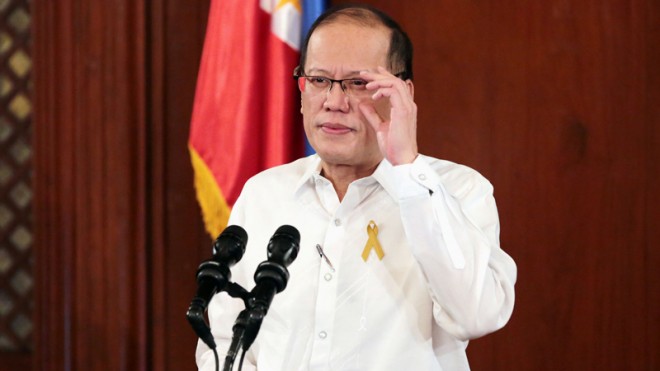MANILA, Philippines–For one senior magistrate, no one else but the President and the national budget office “must answer for” the largely unconstitutional Disbursement Acceleration Program (DAP).
Responsibility for cross-border fund transfers and the appropriation of “unobligated allotments” as augmentation for other priority projects- acts deemed unconstitutional and, thus, illegal by the Supreme Court- rests squarely on President Aquino and the Department of Budget and Management (DBM), Associate Justice Antonio Carpio has said.
In his signed separate opinion obtained by the Inquirer, Carpio identified the President and the DBM, albeit without direct reference to Budget Secretary Florencio Abad, as the “authors” of the largely invalidated program- those who, per the court, may be held liable in case legal action arises in the future over DAP.
“As authors of the constitutional act, they have to answer for such act,” the magistrate said in his opinion on government’s appeal to the high court’s July 1, 2014 ruling, which had invalidated core activities under President’s stimulus program.
The magistrate cited how the President wielded the power to realign savings, and how he and the DBM approved and issued respectively National Budget Circular (NBC) 541.
The July 18, 2012 DAP-linked issuance authorized the withdrawal and reappropriation of “unobligated allotments” from one agency to another in order to fund priority programs- a key activity under the program that the high court had invalidated.
“It was the President who approved NBC 541 (Budget Circular), and it was the DBM which issued and implemented it. NBC 541 directed the “withdrawal of unobligated allotments of agencies with low level of obligations as of June 30, 2012” to augment or fund “priority and/or fast moving programs/projects of the national government.” As discussed, unobligated allotments are not savings,” Carpio said in his 13-page separate opinion.
He said the President and the budget department may not seek the protection of the doctrine of operative fact, which upholds the effects of an unconstitutional law prior to its nullification “as a matter of equity of fair play.”
“Since the President and the DBM approved and issued NBC 541, they are considered the authors of the unconstitutional act. As a consequence, neither the President nor the DBM can invoke the equitable doctrine of operative fact, although they may raise other defenses,” said Carpio.
Anti-DAP petitioners, particularly militant groups, are calling for the President’s and Abad’s accountability for DAP, saying the high court’s Feb. 3 ruling on government’s appeal “should now pave the way” for holding them responsible “for large-scale corruption, bribery and malversation of public funds” under the program.
Acting on government’s motion for reconsideration, the Supreme Court on Tuesday largely upheld its original ruling, revising only one part: that the augmentation of funds for specific projects may now be allowed as long as they have appropriation cover under the General Appropriations Act (GAA).
Still deemed unconstitutional were the withdrawal of “unobligated allotments” from different agencies as savings even before the end of the fiscal year, cross-border transfers of saving, and the use of unprogrammed funds without certification of the national treasurer that revenue collections.
While not in the resolution’s dispositive portion, also part of the ruling is the high court’s clarification that “the presumption of good faith stands” on the part those behind the program. At the same time, only authors, and not “proponents and implementors,” may be held accountable in case legal action is undertaken against DAP.
Carpio articulated this in his separate opinion, saying that the doctrine of operative fact may only be invoked by those who “relied in good faith on the law,” and not by “those directly responsible,” in this case the President and the DBM.
“Only those who merely relied on good faith on the illegal or unconstitutional act, without any direct participation in the commission of the illegal or unconstitutional act, can invoke the doctrine,” said the justice.
To illustrate, Carpio said a governor who merely proposed a project, or an engineer who implemented a government-approved project, may not be held liable as they “would have no idea if the funds were validly realigned or not by the President.”
In his piece, the magistrate also denied government’s claim in its appeal that the judiciary had itself committed cross-border fund transfers, as shown in the appropriation of P1.865 billion in funds for the long-pending construction of the Manila Hall of Justice.
The amount, Carpio said, came from the judiciary’s savings, and not the Department of Justice (DOJ).
He also criticized Congress’ decision to transfer to the DOJ the responsibility of building and maintaining Halls of Justice, saying this “violates” the separation of powers between the executive branch and the judiciary.
“The inclusion of such item in the DOJ budget clearly creates an anomaly where the judiciary will have to request the DOJ, an executive department, to construct a Hall of the Justice for the judiciary,” Carpio said.
“Not only does this undermine the independence of the Judiciary, it also violates ultimately the constitutional separation of powers because one branch is made to beg for the appropriations of another branch to be used in the operations of the former,” he said.
RELATED STORIES
Can Aquino be charged over DAP? Not yet, says Escudero
